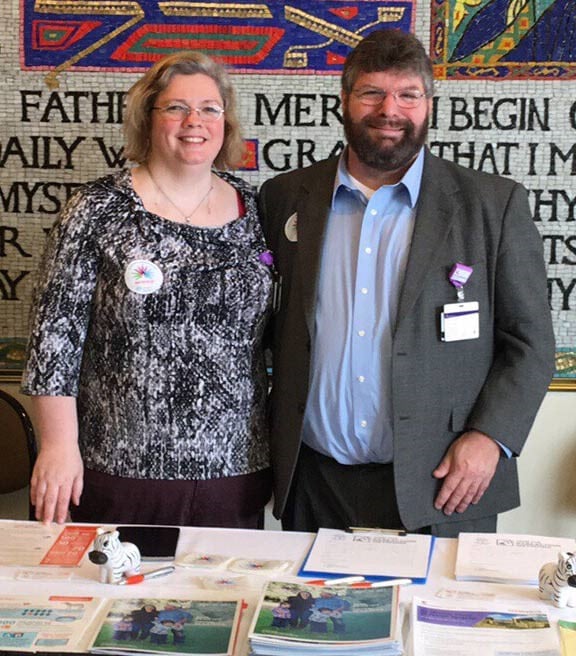
Patients Help Patients Receive Care at the University of Louisville GI Motility Clinic
Gastroparesis Support Services, Inc. co-founder, Patrick Dunegan, talks about how the organization got started and reflects on what can happen when patients support patients.
For many individuals with gastroparesis, obtaining a diagnosis and receiving knowledgeable care often means traveling great distances to the relatively few, dispersed hospitals and clinics across the country that specialize in gastroparesis and other disorders affecting gastrointestinal (GI) motility. One such clinic is the University of Louisville GI Motility Clinic in Louisville, Kentucky. The clinic represents a collaborative effort between the Jewish Hospital and the University of Louisville and brings together gastroenterologists and surgeons with expertise in the treatment and care of gastroparesis and other motility disorders. Led by gastroenterologist Thomas Abell, MD, the clinic is one of only a few nationwide that offer temporary and permanent gastric stimulators to help manage symptoms of gastroparesis, such as chronic nausea and vomiting.
Many patients seen at the clinic travel considerable distances to receive care, coming from outside the state or even travelling internationally. This can be a significant financial burden for those affected and their families who are forced to uproot their lives and afford travel, food, and accommodation while receiving care. To lessen the financial burden many patients and families face, Patrick and Jennifer Dunegan started Gastroparesis Support Services, Inc. (GSSI), a non-profit organization that provides hotel rooms, food, and local transportation for patients receiving treatment at the clinic. Here, IFFGD talks with Patrick about the organization and the critical role it plays in helping patients get the care they need.
Receiving its non-profit designation last year, GSSI was a dream for Jennifer and Patrick for several years. “We pursued this dream because we recognized the needs gastroparesis patients across the United States have,” said Patrick. “Up to 60% of patients travel far enough away from Louisville that they need more than just medical support.” But, the dream wasn’t just their idea. “When Jennifer was diagnosed with gastroparesis and recovering in her hospital room, Dr. Abell came in and jokingly we mentioned that there should be a GP House, just like the Ronald McDonald House,” Patrick explained. “We decided to call it ‘Jennifer’s GP House.’ But, because we don’t have a house, it was named ‘Gastroparesis Support Services, Inc.,’ and we offer hotels, food cards to area restaurants, grocery cards, and local travel with ride shares like Uber and Lyft when funding is available,” Patrick continued. But, their dream for a house that can support patients and families while receiving care hasn’t changed. Said Patrick, “Jennifer’s GP House is still our main goal.”
In addition to covering costs associated with local travel and accommodations while receiving care, GSSI supplies patients and families with gift bags to help with basic needs. Along with personal care items, the bags contain coloring books, crossword puzzles, and games meant to help patients pass the time between tests and treatments. Dr. Abell and the medical staff at the clinic haven even contributed. “They helped us put together resource sheets for the gift bags that help patients during their stay and when they get back home,” said Patrick. Some of these resources are sourced from the IFFGD Publications Library, which is home to over 300 fact sheets covering a range of topics relating to the symptoms, diagnosis, and treatment of gastroparesis and other GI disorders.
Joining together with others in the gastroparesis community and speaking out about the needs of those affected is central to enacting positive change. As part of a national movement to establish state and city proclamations recognizing August as Gastroparesis Awareness Month, GSSI worked to get the observance officially recognized in the state of Kentucky in 2018. Earlier this month, Kentucky Governor Matt Bevin issued a proclamation for Gastroparesis Awareness Month 2018. “Through this recognition from Governor Bevin, we seek to encourage more research, improved medication, additional treatment options, better support, and hope for those with gastroparesis,” said Patrick. This proclamation was shortly followed by one from Mayor Greg Fischer for the city of Louisville. When asked about what proclamations like these mean for the gastroparesis community, Patrick added, “I believe [they] will bring awareness about gastroparesis. We want people to know there is support for their condition.”
Those affected by gastroparesis and their families face a daily struggle to manage the chronic and often debilitating symptoms. But, the experience of gastroparesis has provided Patrick and Jennifer with unique insights into the needs of the community and how to meet those needs. “I know firsthand what it is like to be a caregiver for someone with gastroparesis and Jennifer lives with it every day and can help patients with her personal experiences,” said Patrick. “So, I have the ability to let other caregivers and patients know what to expect and help them with their condition.” Ultimately, the support, care, and hope provided to so many by GSSI was born through firsthand experience of gastroparesis — its impact on those affected and their loved ones. Patrick concludes, “I would not wish gastroparesis on anyone. But, one thing we have done is turn something bad into something good.”
Learn more about Gastroparesis Support Services, Inc. and how you can help.














